Business Law: Legal Framework for Business and Consumers
VerifiedAdded on 2024/05/21
|19
|5938
|362
Report
AI Summary
This assignment delves into key aspects of business law, including the legal relationship between businesses and consumers, consumer credit agreements, agency law, competition law, and intellectual property rights. It analyzes implied terms in sales contracts, statutory provisions for property transfer, remedies for buyers and sellers, and product liability. The assignment also differentiates between types of consumer credit agreements, examines termination rights, and explores the features, rights, and duties of agents. Further, it outlines monopolies and anti-competitive practices legislation in the UK and EU, including the role of regulatory bodies and potential exemptions. Finally, the assignment identifies and explains different forms of intellectual property rights, focusing on patents, copyrights, trademarks, and business names, supported by relevant case laws and legal sources. Desklib offers a wealth of similar solved assignments and past papers to aid students in their studies.
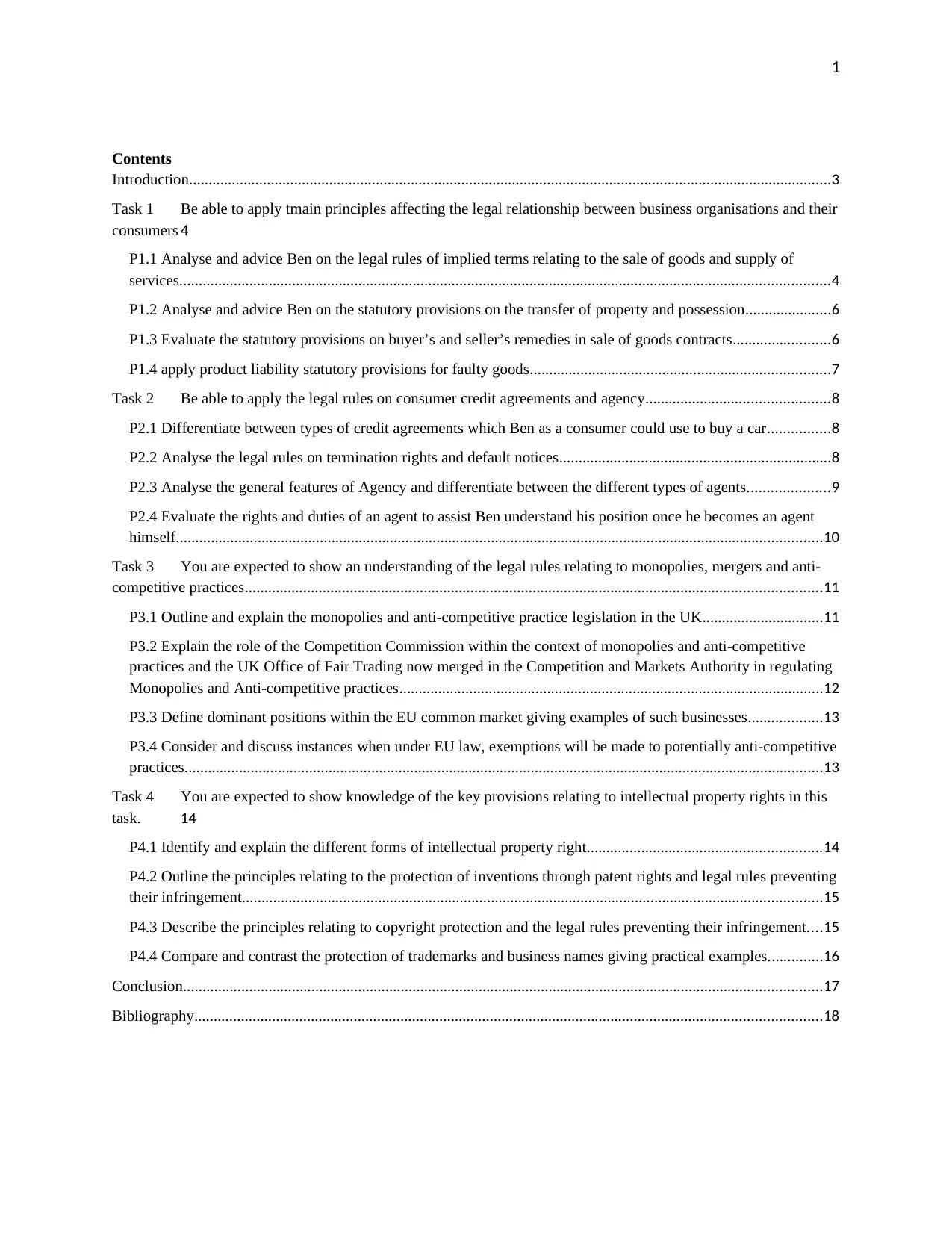
1
Contents
Introduction.....................................................................................................................................................................3
Task 1 Be able to apply tmain principles affecting the legal relationship between business organisations and their
consumers 4
P1.1 Analyse and advice Ben on the legal rules of implied terms relating to the sale of goods and supply of
services.......................................................................................................................................................................4
P1.2 Analyse and advice Ben on the statutory provisions on the transfer of property and possession......................6
P1.3 Evaluate the statutory provisions on buyer’s and seller’s remedies in sale of goods contracts.........................6
P1.4 apply product liability statutory provisions for faulty goods.............................................................................7
Task 2 Be able to apply the legal rules on consumer credit agreements and agency...............................................8
P2.1 Differentiate between types of credit agreements which Ben as a consumer could use to buy a car................8
P2.2 Analyse the legal rules on termination rights and default notices......................................................................8
P2.3 Analyse the general features of Agency and differentiate between the different types of agents.....................9
P2.4 Evaluate the rights and duties of an agent to assist Ben understand his position once he becomes an agent
himself......................................................................................................................................................................10
Task 3 You are expected to show an understanding of the legal rules relating to monopolies, mergers and anti-
competitive practices....................................................................................................................................................11
P3.1 Outline and explain the monopolies and anti-competitive practice legislation in the UK...............................11
P3.2 Explain the role of the Competition Commission within the context of monopolies and anti-competitive
practices and the UK Office of Fair Trading now merged in the Competition and Markets Authority in regulating
Monopolies and Anti-competitive practices.............................................................................................................12
P3.3 Define dominant positions within the EU common market giving examples of such businesses...................13
P3.4 Consider and discuss instances when under EU law, exemptions will be made to potentially anti-competitive
practices....................................................................................................................................................................13
Task 4 You are expected to show knowledge of the key provisions relating to intellectual property rights in this
task. 14
P4.1 Identify and explain the different forms of intellectual property right............................................................14
P4.2 Outline the principles relating to the protection of inventions through patent rights and legal rules preventing
their infringement.....................................................................................................................................................15
P4.3 Describe the principles relating to copyright protection and the legal rules preventing their infringement....15
P4.4 Compare and contrast the protection of trademarks and business names giving practical examples..............16
Conclusion....................................................................................................................................................................17
Bibliography.................................................................................................................................................................18
Contents
Introduction.....................................................................................................................................................................3
Task 1 Be able to apply tmain principles affecting the legal relationship between business organisations and their
consumers 4
P1.1 Analyse and advice Ben on the legal rules of implied terms relating to the sale of goods and supply of
services.......................................................................................................................................................................4
P1.2 Analyse and advice Ben on the statutory provisions on the transfer of property and possession......................6
P1.3 Evaluate the statutory provisions on buyer’s and seller’s remedies in sale of goods contracts.........................6
P1.4 apply product liability statutory provisions for faulty goods.............................................................................7
Task 2 Be able to apply the legal rules on consumer credit agreements and agency...............................................8
P2.1 Differentiate between types of credit agreements which Ben as a consumer could use to buy a car................8
P2.2 Analyse the legal rules on termination rights and default notices......................................................................8
P2.3 Analyse the general features of Agency and differentiate between the different types of agents.....................9
P2.4 Evaluate the rights and duties of an agent to assist Ben understand his position once he becomes an agent
himself......................................................................................................................................................................10
Task 3 You are expected to show an understanding of the legal rules relating to monopolies, mergers and anti-
competitive practices....................................................................................................................................................11
P3.1 Outline and explain the monopolies and anti-competitive practice legislation in the UK...............................11
P3.2 Explain the role of the Competition Commission within the context of monopolies and anti-competitive
practices and the UK Office of Fair Trading now merged in the Competition and Markets Authority in regulating
Monopolies and Anti-competitive practices.............................................................................................................12
P3.3 Define dominant positions within the EU common market giving examples of such businesses...................13
P3.4 Consider and discuss instances when under EU law, exemptions will be made to potentially anti-competitive
practices....................................................................................................................................................................13
Task 4 You are expected to show knowledge of the key provisions relating to intellectual property rights in this
task. 14
P4.1 Identify and explain the different forms of intellectual property right............................................................14
P4.2 Outline the principles relating to the protection of inventions through patent rights and legal rules preventing
their infringement.....................................................................................................................................................15
P4.3 Describe the principles relating to copyright protection and the legal rules preventing their infringement....15
P4.4 Compare and contrast the protection of trademarks and business names giving practical examples..............16
Conclusion....................................................................................................................................................................17
Bibliography.................................................................................................................................................................18
Paraphrase This Document
Need a fresh take? Get an instant paraphrase of this document with our AI Paraphraser
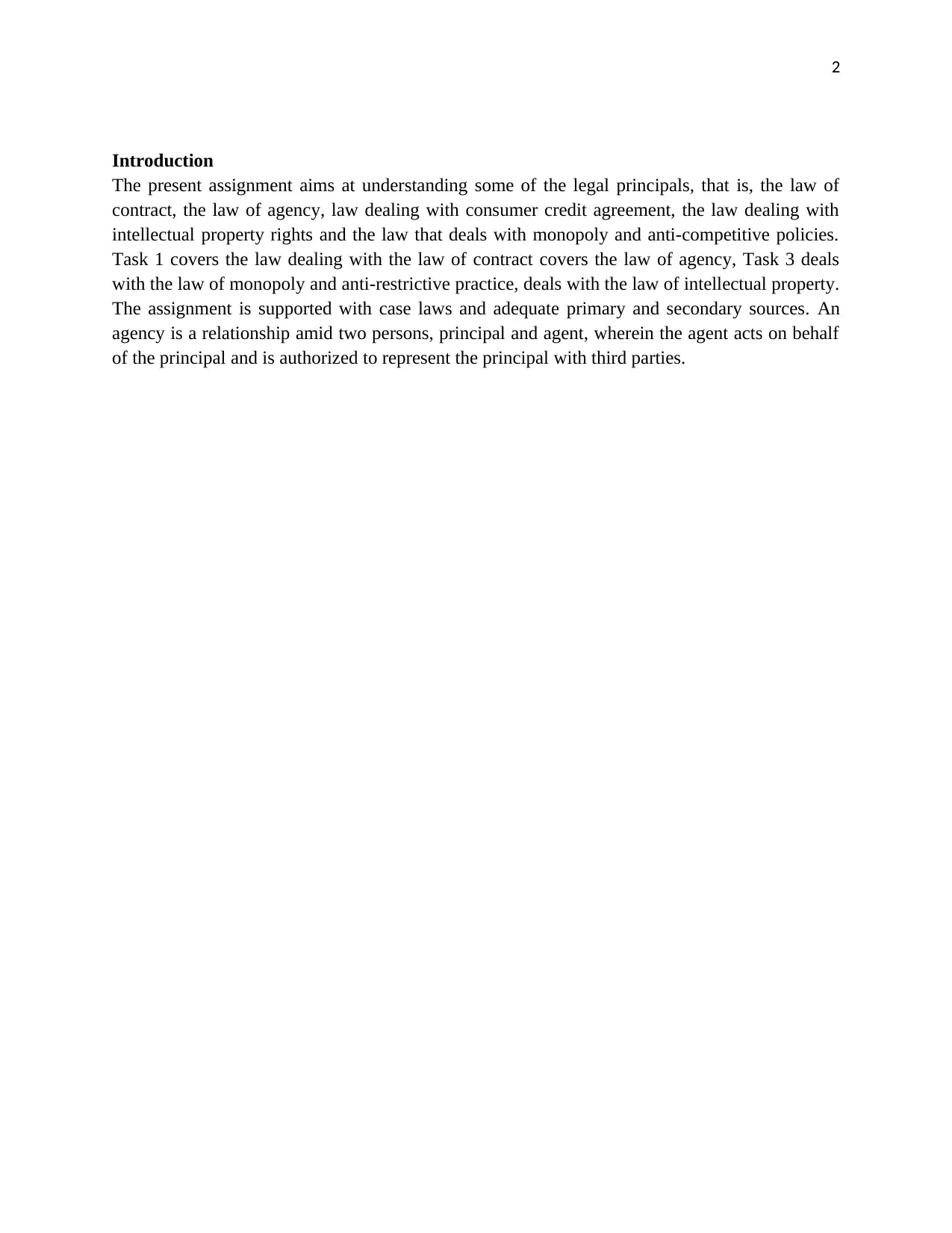
2
Introduction
The present assignment aims at understanding some of the legal principals, that is, the law of
contract, the law of agency, law dealing with consumer credit agreement, the law dealing with
intellectual property rights and the law that deals with monopoly and anti-competitive policies.
Task 1 covers the law dealing with the law of contract covers the law of agency, Task 3 deals
with the law of monopoly and anti-restrictive practice, deals with the law of intellectual property.
The assignment is supported with case laws and adequate primary and secondary sources. An
agency is a relationship amid two persons, principal and agent, wherein the agent acts on behalf
of the principal and is authorized to represent the principal with third parties.
Introduction
The present assignment aims at understanding some of the legal principals, that is, the law of
contract, the law of agency, law dealing with consumer credit agreement, the law dealing with
intellectual property rights and the law that deals with monopoly and anti-competitive policies.
Task 1 covers the law dealing with the law of contract covers the law of agency, Task 3 deals
with the law of monopoly and anti-restrictive practice, deals with the law of intellectual property.
The assignment is supported with case laws and adequate primary and secondary sources. An
agency is a relationship amid two persons, principal and agent, wherein the agent acts on behalf
of the principal and is authorized to represent the principal with third parties.
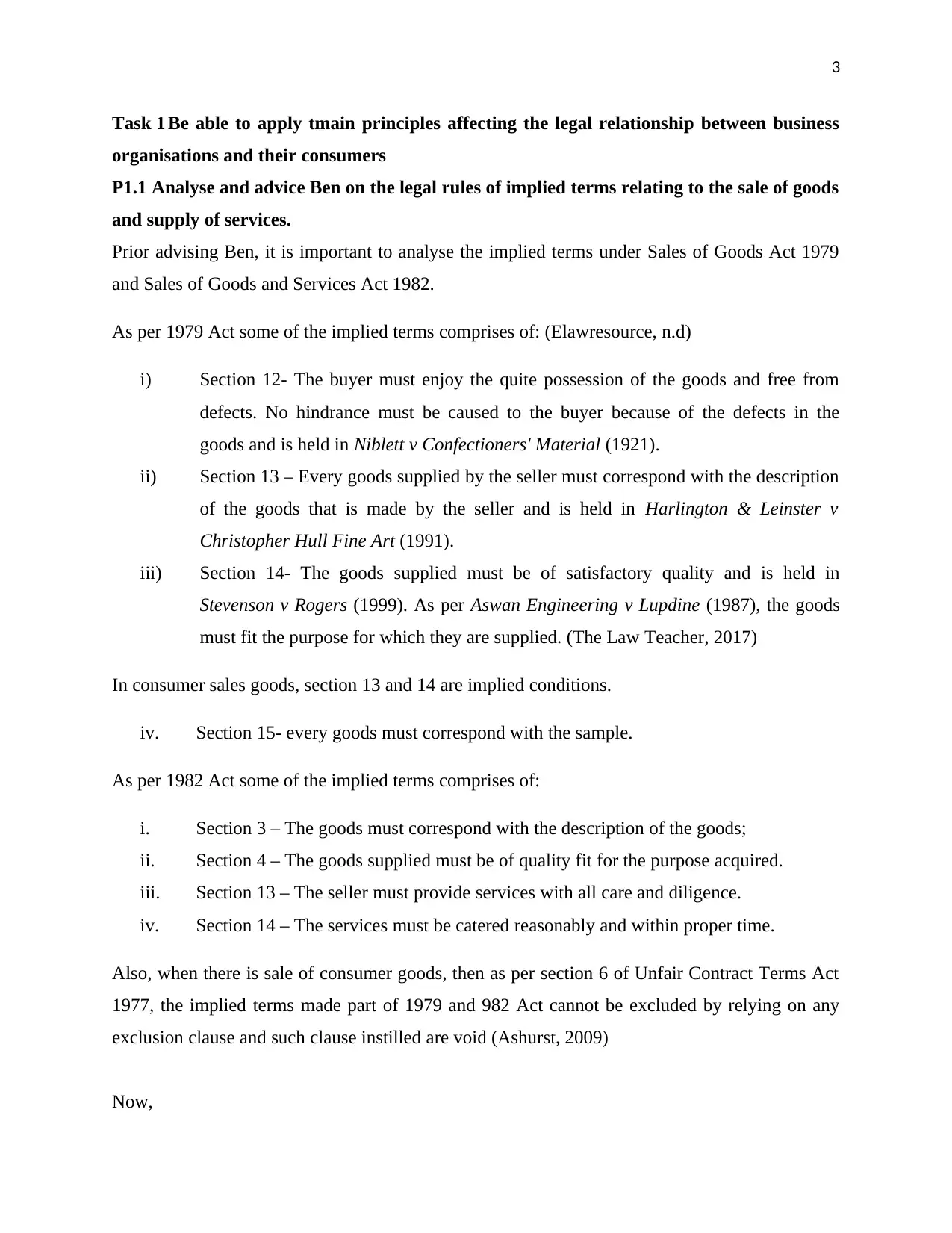
3
Task 1 Be able to apply tmain principles affecting the legal relationship between business
organisations and their consumers
P1.1 Analyse and advice Ben on the legal rules of implied terms relating to the sale of goods
and supply of services.
Prior advising Ben, it is important to analyse the implied terms under Sales of Goods Act 1979
and Sales of Goods and Services Act 1982.
As per 1979 Act some of the implied terms comprises of: (Elawresource, n.d)
i) Section 12- The buyer must enjoy the quite possession of the goods and free from
defects. No hindrance must be caused to the buyer because of the defects in the
goods and is held in Niblett v Confectioners' Material (1921).
ii) Section 13 – Every goods supplied by the seller must correspond with the description
of the goods that is made by the seller and is held in Harlington & Leinster v
Christopher Hull Fine Art (1991).
iii) Section 14- The goods supplied must be of satisfactory quality and is held in
Stevenson v Rogers (1999). As per Aswan Engineering v Lupdine (1987), the goods
must fit the purpose for which they are supplied. (The Law Teacher, 2017)
In consumer sales goods, section 13 and 14 are implied conditions.
iv. Section 15- every goods must correspond with the sample.
As per 1982 Act some of the implied terms comprises of:
i. Section 3 – The goods must correspond with the description of the goods;
ii. Section 4 – The goods supplied must be of quality fit for the purpose acquired.
iii. Section 13 – The seller must provide services with all care and diligence.
iv. Section 14 – The services must be catered reasonably and within proper time.
Also, when there is sale of consumer goods, then as per section 6 of Unfair Contract Terms Act
1977, the implied terms made part of 1979 and 982 Act cannot be excluded by relying on any
exclusion clause and such clause instilled are void (Ashurst, 2009)
Now,
Task 1 Be able to apply tmain principles affecting the legal relationship between business
organisations and their consumers
P1.1 Analyse and advice Ben on the legal rules of implied terms relating to the sale of goods
and supply of services.
Prior advising Ben, it is important to analyse the implied terms under Sales of Goods Act 1979
and Sales of Goods and Services Act 1982.
As per 1979 Act some of the implied terms comprises of: (Elawresource, n.d)
i) Section 12- The buyer must enjoy the quite possession of the goods and free from
defects. No hindrance must be caused to the buyer because of the defects in the
goods and is held in Niblett v Confectioners' Material (1921).
ii) Section 13 – Every goods supplied by the seller must correspond with the description
of the goods that is made by the seller and is held in Harlington & Leinster v
Christopher Hull Fine Art (1991).
iii) Section 14- The goods supplied must be of satisfactory quality and is held in
Stevenson v Rogers (1999). As per Aswan Engineering v Lupdine (1987), the goods
must fit the purpose for which they are supplied. (The Law Teacher, 2017)
In consumer sales goods, section 13 and 14 are implied conditions.
iv. Section 15- every goods must correspond with the sample.
As per 1982 Act some of the implied terms comprises of:
i. Section 3 – The goods must correspond with the description of the goods;
ii. Section 4 – The goods supplied must be of quality fit for the purpose acquired.
iii. Section 13 – The seller must provide services with all care and diligence.
iv. Section 14 – The services must be catered reasonably and within proper time.
Also, when there is sale of consumer goods, then as per section 6 of Unfair Contract Terms Act
1977, the implied terms made part of 1979 and 982 Act cannot be excluded by relying on any
exclusion clause and such clause instilled are void (Ashurst, 2009)
Now,
⊘ This is a preview!⊘
Do you want full access?
Subscribe today to unlock all pages.

Trusted by 1+ million students worldwide
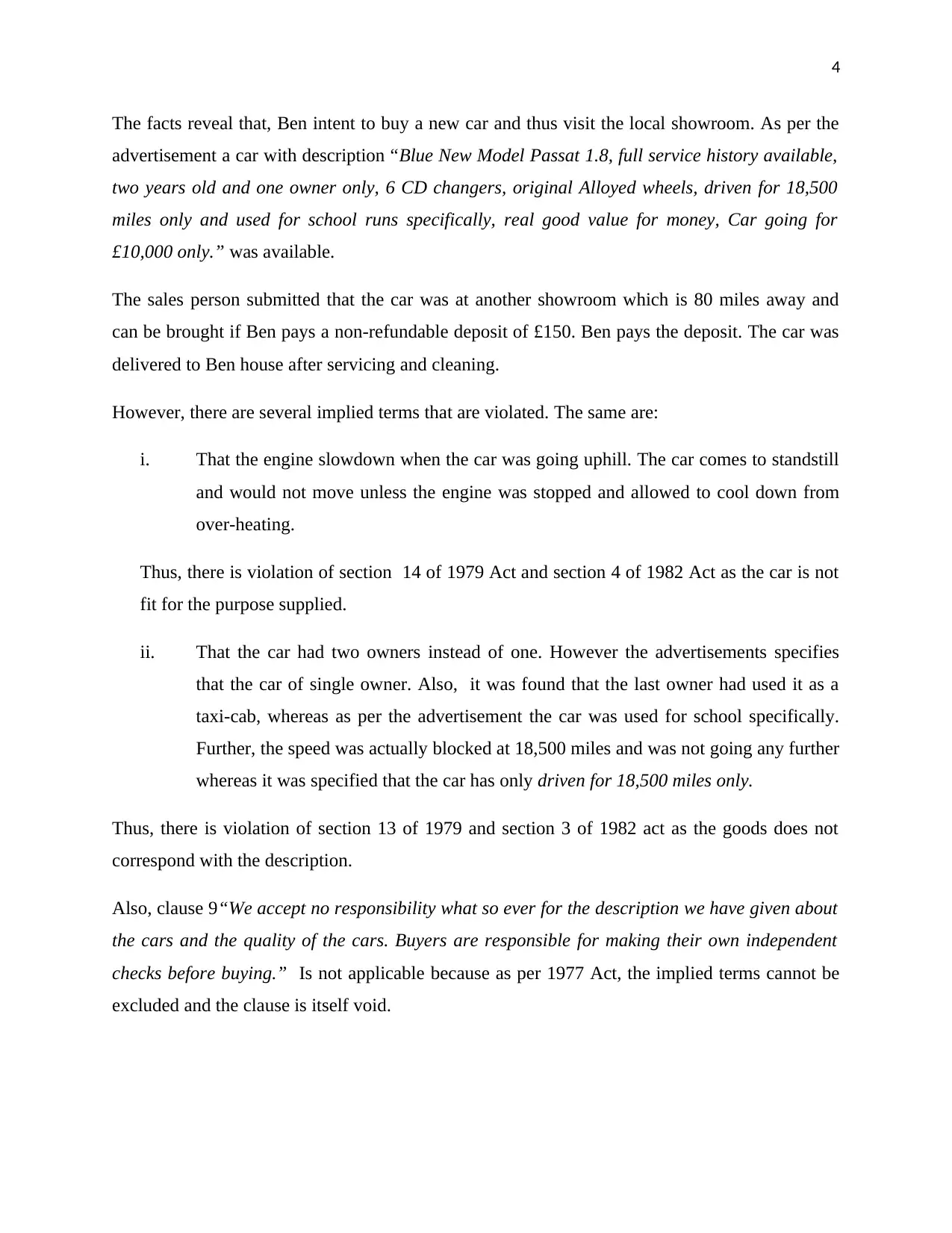
4
The facts reveal that, Ben intent to buy a new car and thus visit the local showroom. As per the
advertisement a car with description “Blue New Model Passat 1.8, full service history available,
two years old and one owner only, 6 CD changers, original Alloyed wheels, driven for 18,500
miles only and used for school runs specifically, real good value for money, Car going for
£10,000 only.” was available.
The sales person submitted that the car was at another showroom which is 80 miles away and
can be brought if Ben pays a non-refundable deposit of £150. Ben pays the deposit. The car was
delivered to Ben house after servicing and cleaning.
However, there are several implied terms that are violated. The same are:
i. That the engine slowdown when the car was going uphill. The car comes to standstill
and would not move unless the engine was stopped and allowed to cool down from
over-heating.
Thus, there is violation of section 14 of 1979 Act and section 4 of 1982 Act as the car is not
fit for the purpose supplied.
ii. That the car had two owners instead of one. However the advertisements specifies
that the car of single owner. Also, it was found that the last owner had used it as a
taxi-cab, whereas as per the advertisement the car was used for school specifically.
Further, the speed was actually blocked at 18,500 miles and was not going any further
whereas it was specified that the car has only driven for 18,500 miles only.
Thus, there is violation of section 13 of 1979 and section 3 of 1982 act as the goods does not
correspond with the description.
Also, clause 9“We accept no responsibility what so ever for the description we have given about
the cars and the quality of the cars. Buyers are responsible for making their own independent
checks before buying.” Is not applicable because as per 1977 Act, the implied terms cannot be
excluded and the clause is itself void.
The facts reveal that, Ben intent to buy a new car and thus visit the local showroom. As per the
advertisement a car with description “Blue New Model Passat 1.8, full service history available,
two years old and one owner only, 6 CD changers, original Alloyed wheels, driven for 18,500
miles only and used for school runs specifically, real good value for money, Car going for
£10,000 only.” was available.
The sales person submitted that the car was at another showroom which is 80 miles away and
can be brought if Ben pays a non-refundable deposit of £150. Ben pays the deposit. The car was
delivered to Ben house after servicing and cleaning.
However, there are several implied terms that are violated. The same are:
i. That the engine slowdown when the car was going uphill. The car comes to standstill
and would not move unless the engine was stopped and allowed to cool down from
over-heating.
Thus, there is violation of section 14 of 1979 Act and section 4 of 1982 Act as the car is not
fit for the purpose supplied.
ii. That the car had two owners instead of one. However the advertisements specifies
that the car of single owner. Also, it was found that the last owner had used it as a
taxi-cab, whereas as per the advertisement the car was used for school specifically.
Further, the speed was actually blocked at 18,500 miles and was not going any further
whereas it was specified that the car has only driven for 18,500 miles only.
Thus, there is violation of section 13 of 1979 and section 3 of 1982 act as the goods does not
correspond with the description.
Also, clause 9“We accept no responsibility what so ever for the description we have given about
the cars and the quality of the cars. Buyers are responsible for making their own independent
checks before buying.” Is not applicable because as per 1977 Act, the implied terms cannot be
excluded and the clause is itself void.
Paraphrase This Document
Need a fresh take? Get an instant paraphrase of this document with our AI Paraphraser
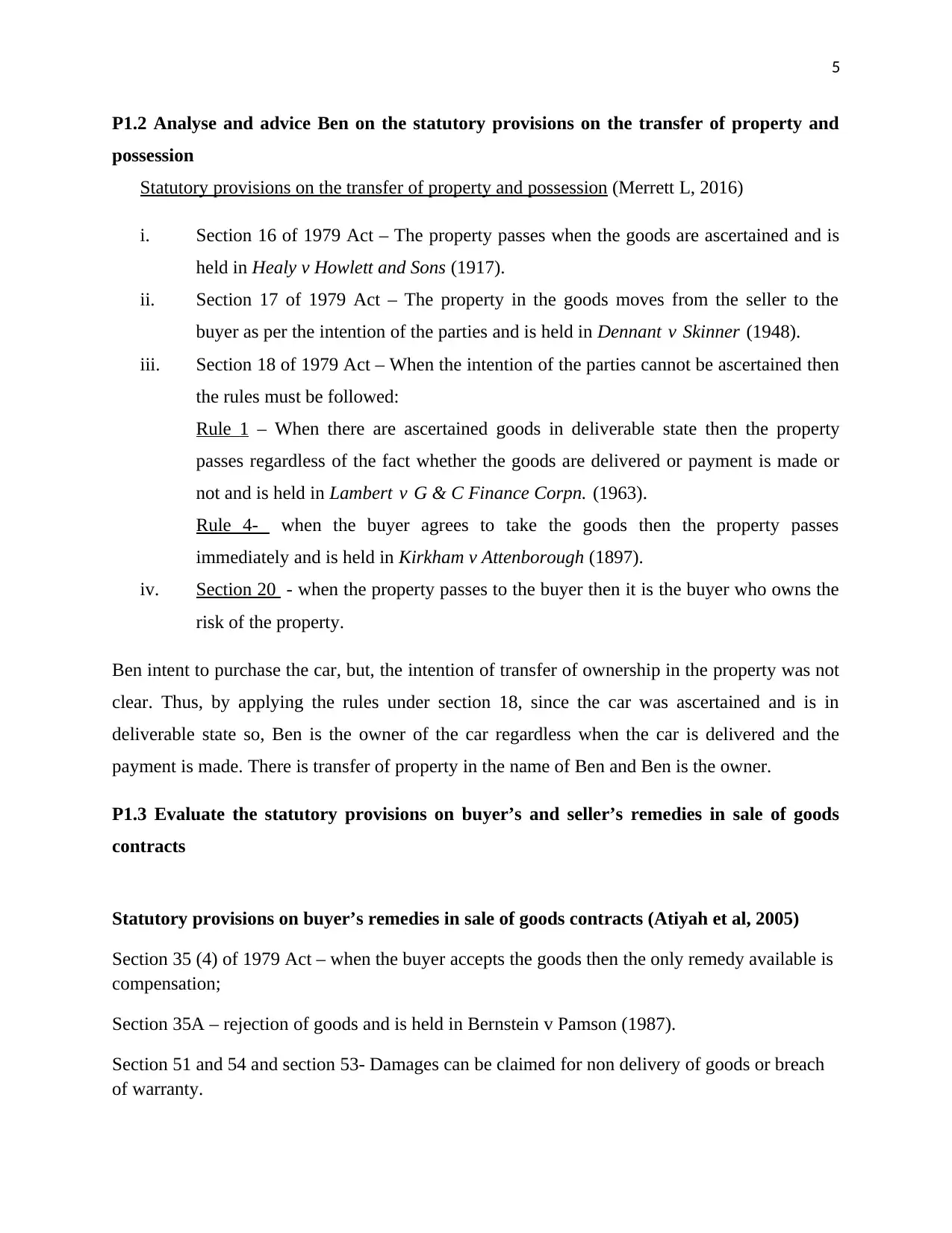
5
P1.2 Analyse and advice Ben on the statutory provisions on the transfer of property and
possession
Statutory provisions on the transfer of property and possession (Merrett L, 2016)
i. Section 16 of 1979 Act – The property passes when the goods are ascertained and is
held in Healy v Howlett and Sons (1917).
ii. Section 17 of 1979 Act – The property in the goods moves from the seller to the
buyer as per the intention of the parties and is held in Dennant v Skinner (1948).
iii. Section 18 of 1979 Act – When the intention of the parties cannot be ascertained then
the rules must be followed:
Rule 1 – When there are ascertained goods in deliverable state then the property
passes regardless of the fact whether the goods are delivered or payment is made or
not and is held in Lambert v G & C Finance Corpn. (1963).
Rule 4- when the buyer agrees to take the goods then the property passes
immediately and is held in Kirkham v Attenborough (1897).
iv. Section 20 - when the property passes to the buyer then it is the buyer who owns the
risk of the property.
Ben intent to purchase the car, but, the intention of transfer of ownership in the property was not
clear. Thus, by applying the rules under section 18, since the car was ascertained and is in
deliverable state so, Ben is the owner of the car regardless when the car is delivered and the
payment is made. There is transfer of property in the name of Ben and Ben is the owner.
P1.3 Evaluate the statutory provisions on buyer’s and seller’s remedies in sale of goods
contracts
Statutory provisions on buyer’s remedies in sale of goods contracts (Atiyah et al, 2005)
Section 35 (4) of 1979 Act – when the buyer accepts the goods then the only remedy available is
compensation;
Section 35A – rejection of goods and is held in Bernstein v Pamson (1987).
Section 51 and 54 and section 53- Damages can be claimed for non delivery of goods or breach
of warranty.
P1.2 Analyse and advice Ben on the statutory provisions on the transfer of property and
possession
Statutory provisions on the transfer of property and possession (Merrett L, 2016)
i. Section 16 of 1979 Act – The property passes when the goods are ascertained and is
held in Healy v Howlett and Sons (1917).
ii. Section 17 of 1979 Act – The property in the goods moves from the seller to the
buyer as per the intention of the parties and is held in Dennant v Skinner (1948).
iii. Section 18 of 1979 Act – When the intention of the parties cannot be ascertained then
the rules must be followed:
Rule 1 – When there are ascertained goods in deliverable state then the property
passes regardless of the fact whether the goods are delivered or payment is made or
not and is held in Lambert v G & C Finance Corpn. (1963).
Rule 4- when the buyer agrees to take the goods then the property passes
immediately and is held in Kirkham v Attenborough (1897).
iv. Section 20 - when the property passes to the buyer then it is the buyer who owns the
risk of the property.
Ben intent to purchase the car, but, the intention of transfer of ownership in the property was not
clear. Thus, by applying the rules under section 18, since the car was ascertained and is in
deliverable state so, Ben is the owner of the car regardless when the car is delivered and the
payment is made. There is transfer of property in the name of Ben and Ben is the owner.
P1.3 Evaluate the statutory provisions on buyer’s and seller’s remedies in sale of goods
contracts
Statutory provisions on buyer’s remedies in sale of goods contracts (Atiyah et al, 2005)
Section 35 (4) of 1979 Act – when the buyer accepts the goods then the only remedy available is
compensation;
Section 35A – rejection of goods and is held in Bernstein v Pamson (1987).
Section 51 and 54 and section 53- Damages can be claimed for non delivery of goods or breach
of warranty.
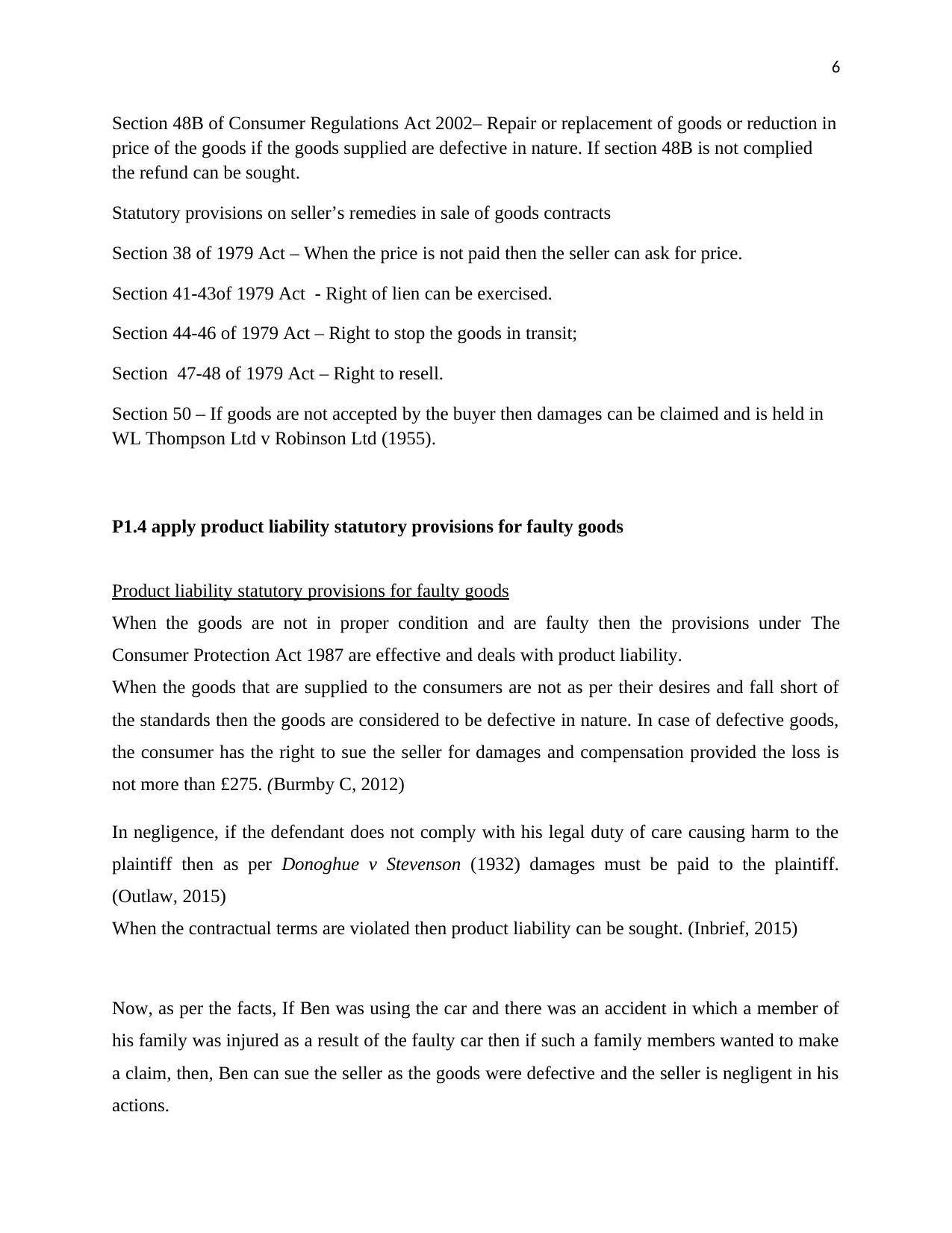
6
Section 48B of Consumer Regulations Act 2002– Repair or replacement of goods or reduction in
price of the goods if the goods supplied are defective in nature. If section 48B is not complied
the refund can be sought.
Statutory provisions on seller’s remedies in sale of goods contracts
Section 38 of 1979 Act – When the price is not paid then the seller can ask for price.
Section 41-43of 1979 Act - Right of lien can be exercised.
Section 44-46 of 1979 Act – Right to stop the goods in transit;
Section 47-48 of 1979 Act – Right to resell.
Section 50 – If goods are not accepted by the buyer then damages can be claimed and is held in
WL Thompson Ltd v Robinson Ltd (1955).
P1.4 apply product liability statutory provisions for faulty goods
Product liability statutory provisions for faulty goods
When the goods are not in proper condition and are faulty then the provisions under The
Consumer Protection Act 1987 are effective and deals with product liability.
When the goods that are supplied to the consumers are not as per their desires and fall short of
the standards then the goods are considered to be defective in nature. In case of defective goods,
the consumer has the right to sue the seller for damages and compensation provided the loss is
not more than £275. (Burmby C, 2012)
In negligence, if the defendant does not comply with his legal duty of care causing harm to the
plaintiff then as per Donoghue v Stevenson (1932) damages must be paid to the plaintiff.
(Outlaw, 2015)
When the contractual terms are violated then product liability can be sought. (Inbrief, 2015)
Now, as per the facts, If Ben was using the car and there was an accident in which a member of
his family was injured as a result of the faulty car then if such a family members wanted to make
a claim, then, Ben can sue the seller as the goods were defective and the seller is negligent in his
actions.
Section 48B of Consumer Regulations Act 2002– Repair or replacement of goods or reduction in
price of the goods if the goods supplied are defective in nature. If section 48B is not complied
the refund can be sought.
Statutory provisions on seller’s remedies in sale of goods contracts
Section 38 of 1979 Act – When the price is not paid then the seller can ask for price.
Section 41-43of 1979 Act - Right of lien can be exercised.
Section 44-46 of 1979 Act – Right to stop the goods in transit;
Section 47-48 of 1979 Act – Right to resell.
Section 50 – If goods are not accepted by the buyer then damages can be claimed and is held in
WL Thompson Ltd v Robinson Ltd (1955).
P1.4 apply product liability statutory provisions for faulty goods
Product liability statutory provisions for faulty goods
When the goods are not in proper condition and are faulty then the provisions under The
Consumer Protection Act 1987 are effective and deals with product liability.
When the goods that are supplied to the consumers are not as per their desires and fall short of
the standards then the goods are considered to be defective in nature. In case of defective goods,
the consumer has the right to sue the seller for damages and compensation provided the loss is
not more than £275. (Burmby C, 2012)
In negligence, if the defendant does not comply with his legal duty of care causing harm to the
plaintiff then as per Donoghue v Stevenson (1932) damages must be paid to the plaintiff.
(Outlaw, 2015)
When the contractual terms are violated then product liability can be sought. (Inbrief, 2015)
Now, as per the facts, If Ben was using the car and there was an accident in which a member of
his family was injured as a result of the faulty car then if such a family members wanted to make
a claim, then, Ben can sue the seller as the goods were defective and the seller is negligent in his
actions.
⊘ This is a preview!⊘
Do you want full access?
Subscribe today to unlock all pages.

Trusted by 1+ million students worldwide
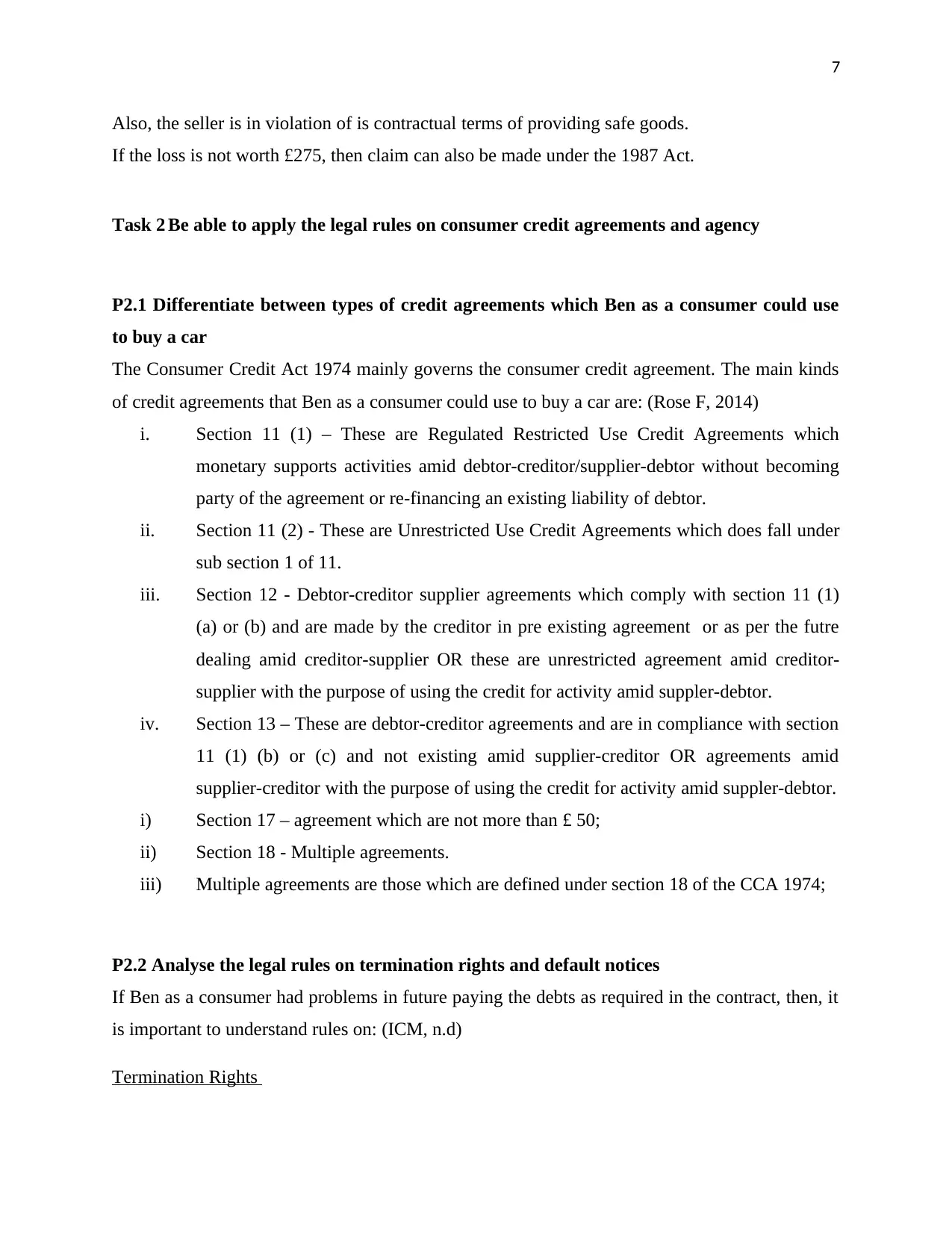
7
Also, the seller is in violation of is contractual terms of providing safe goods.
If the loss is not worth £275, then claim can also be made under the 1987 Act.
Task 2 Be able to apply the legal rules on consumer credit agreements and agency
P2.1 Differentiate between types of credit agreements which Ben as a consumer could use
to buy a car
The Consumer Credit Act 1974 mainly governs the consumer credit agreement. The main kinds
of credit agreements that Ben as a consumer could use to buy a car are: (Rose F, 2014)
i. Section 11 (1) – These are Regulated Restricted Use Credit Agreements which
monetary supports activities amid debtor-creditor/supplier-debtor without becoming
party of the agreement or re-financing an existing liability of debtor.
ii. Section 11 (2) - These are Unrestricted Use Credit Agreements which does fall under
sub section 1 of 11.
iii. Section 12 - Debtor-creditor supplier agreements which comply with section 11 (1)
(a) or (b) and are made by the creditor in pre existing agreement or as per the futre
dealing amid creditor-supplier OR these are unrestricted agreement amid creditor-
supplier with the purpose of using the credit for activity amid suppler-debtor.
iv. Section 13 – These are debtor-creditor agreements and are in compliance with section
11 (1) (b) or (c) and not existing amid supplier-creditor OR agreements amid
supplier-creditor with the purpose of using the credit for activity amid suppler-debtor.
i) Section 17 – agreement which are not more than £ 50;
ii) Section 18 - Multiple agreements.
iii) Multiple agreements are those which are defined under section 18 of the CCA 1974;
P2.2 Analyse the legal rules on termination rights and default notices
If Ben as a consumer had problems in future paying the debts as required in the contract, then, it
is important to understand rules on: (ICM, n.d)
Termination Rights
Also, the seller is in violation of is contractual terms of providing safe goods.
If the loss is not worth £275, then claim can also be made under the 1987 Act.
Task 2 Be able to apply the legal rules on consumer credit agreements and agency
P2.1 Differentiate between types of credit agreements which Ben as a consumer could use
to buy a car
The Consumer Credit Act 1974 mainly governs the consumer credit agreement. The main kinds
of credit agreements that Ben as a consumer could use to buy a car are: (Rose F, 2014)
i. Section 11 (1) – These are Regulated Restricted Use Credit Agreements which
monetary supports activities amid debtor-creditor/supplier-debtor without becoming
party of the agreement or re-financing an existing liability of debtor.
ii. Section 11 (2) - These are Unrestricted Use Credit Agreements which does fall under
sub section 1 of 11.
iii. Section 12 - Debtor-creditor supplier agreements which comply with section 11 (1)
(a) or (b) and are made by the creditor in pre existing agreement or as per the futre
dealing amid creditor-supplier OR these are unrestricted agreement amid creditor-
supplier with the purpose of using the credit for activity amid suppler-debtor.
iv. Section 13 – These are debtor-creditor agreements and are in compliance with section
11 (1) (b) or (c) and not existing amid supplier-creditor OR agreements amid
supplier-creditor with the purpose of using the credit for activity amid suppler-debtor.
i) Section 17 – agreement which are not more than £ 50;
ii) Section 18 - Multiple agreements.
iii) Multiple agreements are those which are defined under section 18 of the CCA 1974;
P2.2 Analyse the legal rules on termination rights and default notices
If Ben as a consumer had problems in future paying the debts as required in the contract, then, it
is important to understand rules on: (ICM, n.d)
Termination Rights
Paraphrase This Document
Need a fresh take? Get an instant paraphrase of this document with our AI Paraphraser
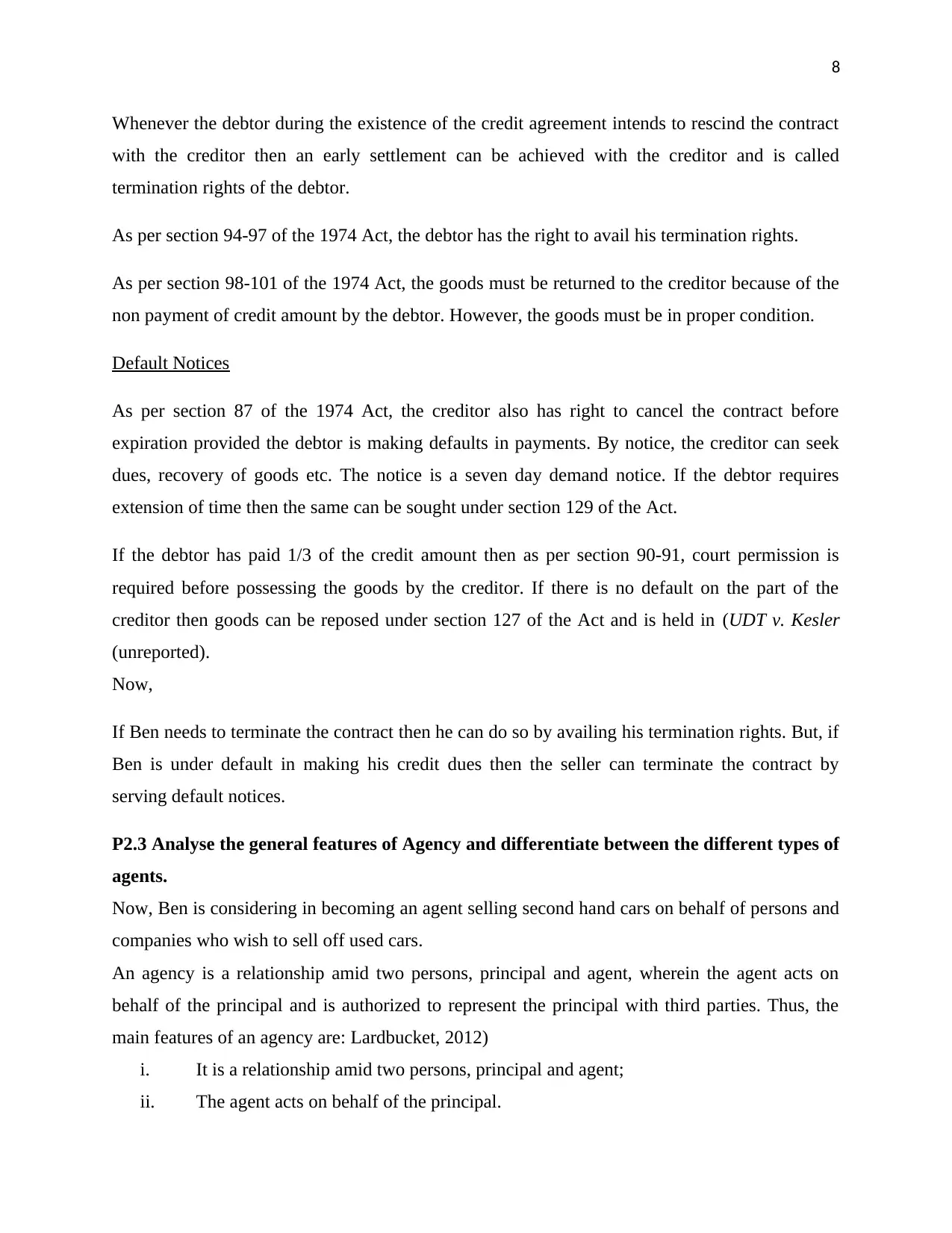
8
Whenever the debtor during the existence of the credit agreement intends to rescind the contract
with the creditor then an early settlement can be achieved with the creditor and is called
termination rights of the debtor.
As per section 94-97 of the 1974 Act, the debtor has the right to avail his termination rights.
As per section 98-101 of the 1974 Act, the goods must be returned to the creditor because of the
non payment of credit amount by the debtor. However, the goods must be in proper condition.
Default Notices
As per section 87 of the 1974 Act, the creditor also has right to cancel the contract before
expiration provided the debtor is making defaults in payments. By notice, the creditor can seek
dues, recovery of goods etc. The notice is a seven day demand notice. If the debtor requires
extension of time then the same can be sought under section 129 of the Act.
If the debtor has paid 1/3 of the credit amount then as per section 90-91, court permission is
required before possessing the goods by the creditor. If there is no default on the part of the
creditor then goods can be reposed under section 127 of the Act and is held in (UDT v. Kesler
(unreported).
Now,
If Ben needs to terminate the contract then he can do so by availing his termination rights. But, if
Ben is under default in making his credit dues then the seller can terminate the contract by
serving default notices.
P2.3 Analyse the general features of Agency and differentiate between the different types of
agents.
Now, Ben is considering in becoming an agent selling second hand cars on behalf of persons and
companies who wish to sell off used cars.
An agency is a relationship amid two persons, principal and agent, wherein the agent acts on
behalf of the principal and is authorized to represent the principal with third parties. Thus, the
main features of an agency are: Lardbucket, 2012)
i. It is a relationship amid two persons, principal and agent;
ii. The agent acts on behalf of the principal.
Whenever the debtor during the existence of the credit agreement intends to rescind the contract
with the creditor then an early settlement can be achieved with the creditor and is called
termination rights of the debtor.
As per section 94-97 of the 1974 Act, the debtor has the right to avail his termination rights.
As per section 98-101 of the 1974 Act, the goods must be returned to the creditor because of the
non payment of credit amount by the debtor. However, the goods must be in proper condition.
Default Notices
As per section 87 of the 1974 Act, the creditor also has right to cancel the contract before
expiration provided the debtor is making defaults in payments. By notice, the creditor can seek
dues, recovery of goods etc. The notice is a seven day demand notice. If the debtor requires
extension of time then the same can be sought under section 129 of the Act.
If the debtor has paid 1/3 of the credit amount then as per section 90-91, court permission is
required before possessing the goods by the creditor. If there is no default on the part of the
creditor then goods can be reposed under section 127 of the Act and is held in (UDT v. Kesler
(unreported).
Now,
If Ben needs to terminate the contract then he can do so by availing his termination rights. But, if
Ben is under default in making his credit dues then the seller can terminate the contract by
serving default notices.
P2.3 Analyse the general features of Agency and differentiate between the different types of
agents.
Now, Ben is considering in becoming an agent selling second hand cars on behalf of persons and
companies who wish to sell off used cars.
An agency is a relationship amid two persons, principal and agent, wherein the agent acts on
behalf of the principal and is authorized to represent the principal with third parties. Thus, the
main features of an agency are: Lardbucket, 2012)
i. It is a relationship amid two persons, principal and agent;
ii. The agent acts on behalf of the principal.
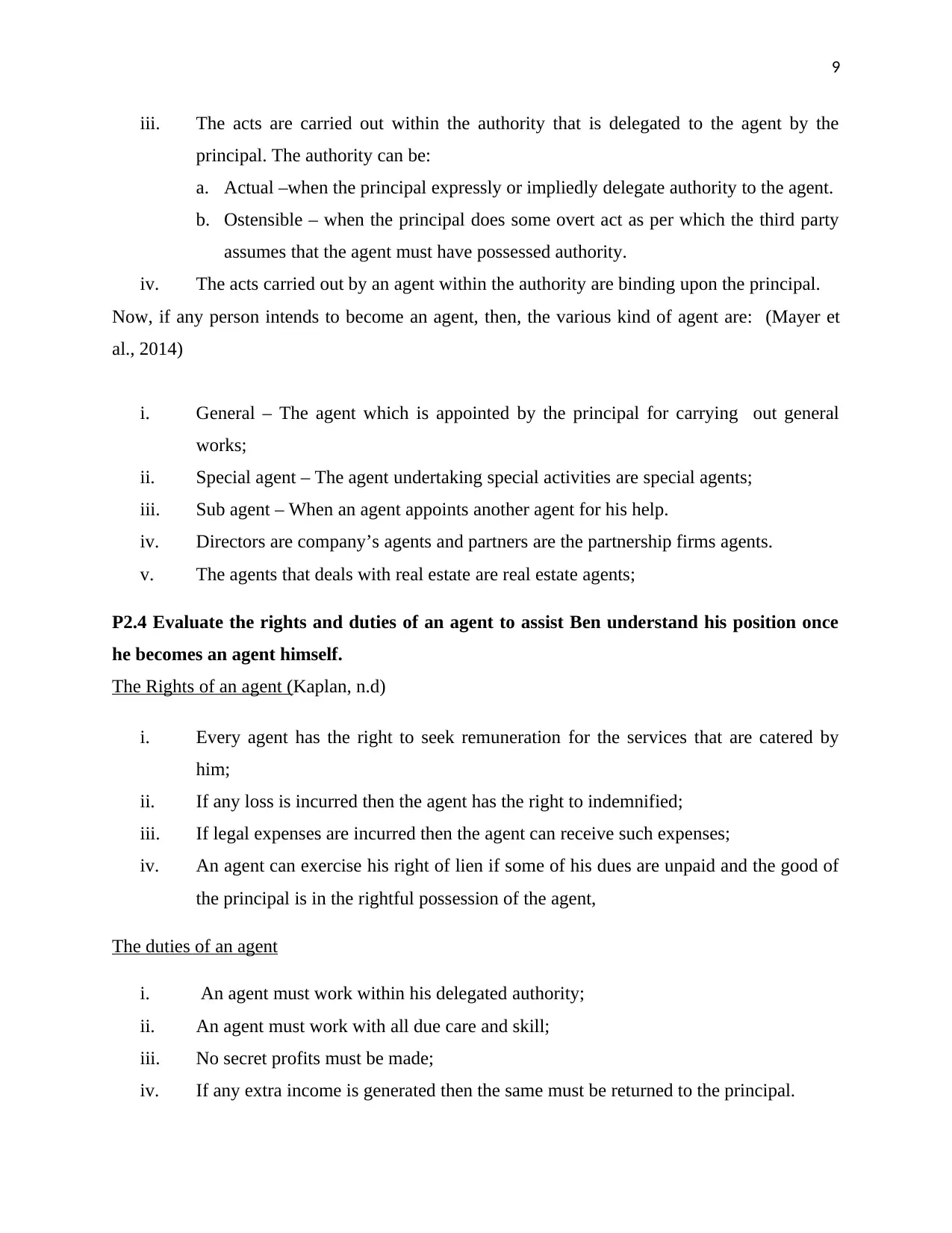
9
iii. The acts are carried out within the authority that is delegated to the agent by the
principal. The authority can be:
a. Actual –when the principal expressly or impliedly delegate authority to the agent.
b. Ostensible – when the principal does some overt act as per which the third party
assumes that the agent must have possessed authority.
iv. The acts carried out by an agent within the authority are binding upon the principal.
Now, if any person intends to become an agent, then, the various kind of agent are: (Mayer et
al., 2014)
i. General – The agent which is appointed by the principal for carrying out general
works;
ii. Special agent – The agent undertaking special activities are special agents;
iii. Sub agent – When an agent appoints another agent for his help.
iv. Directors are company’s agents and partners are the partnership firms agents.
v. The agents that deals with real estate are real estate agents;
P2.4 Evaluate the rights and duties of an agent to assist Ben understand his position once
he becomes an agent himself.
The Rights of an agent (Kaplan, n.d)
i. Every agent has the right to seek remuneration for the services that are catered by
him;
ii. If any loss is incurred then the agent has the right to indemnified;
iii. If legal expenses are incurred then the agent can receive such expenses;
iv. An agent can exercise his right of lien if some of his dues are unpaid and the good of
the principal is in the rightful possession of the agent,
The duties of an agent
i. An agent must work within his delegated authority;
ii. An agent must work with all due care and skill;
iii. No secret profits must be made;
iv. If any extra income is generated then the same must be returned to the principal.
iii. The acts are carried out within the authority that is delegated to the agent by the
principal. The authority can be:
a. Actual –when the principal expressly or impliedly delegate authority to the agent.
b. Ostensible – when the principal does some overt act as per which the third party
assumes that the agent must have possessed authority.
iv. The acts carried out by an agent within the authority are binding upon the principal.
Now, if any person intends to become an agent, then, the various kind of agent are: (Mayer et
al., 2014)
i. General – The agent which is appointed by the principal for carrying out general
works;
ii. Special agent – The agent undertaking special activities are special agents;
iii. Sub agent – When an agent appoints another agent for his help.
iv. Directors are company’s agents and partners are the partnership firms agents.
v. The agents that deals with real estate are real estate agents;
P2.4 Evaluate the rights and duties of an agent to assist Ben understand his position once
he becomes an agent himself.
The Rights of an agent (Kaplan, n.d)
i. Every agent has the right to seek remuneration for the services that are catered by
him;
ii. If any loss is incurred then the agent has the right to indemnified;
iii. If legal expenses are incurred then the agent can receive such expenses;
iv. An agent can exercise his right of lien if some of his dues are unpaid and the good of
the principal is in the rightful possession of the agent,
The duties of an agent
i. An agent must work within his delegated authority;
ii. An agent must work with all due care and skill;
iii. No secret profits must be made;
iv. If any extra income is generated then the same must be returned to the principal.
⊘ This is a preview!⊘
Do you want full access?
Subscribe today to unlock all pages.

Trusted by 1+ million students worldwide
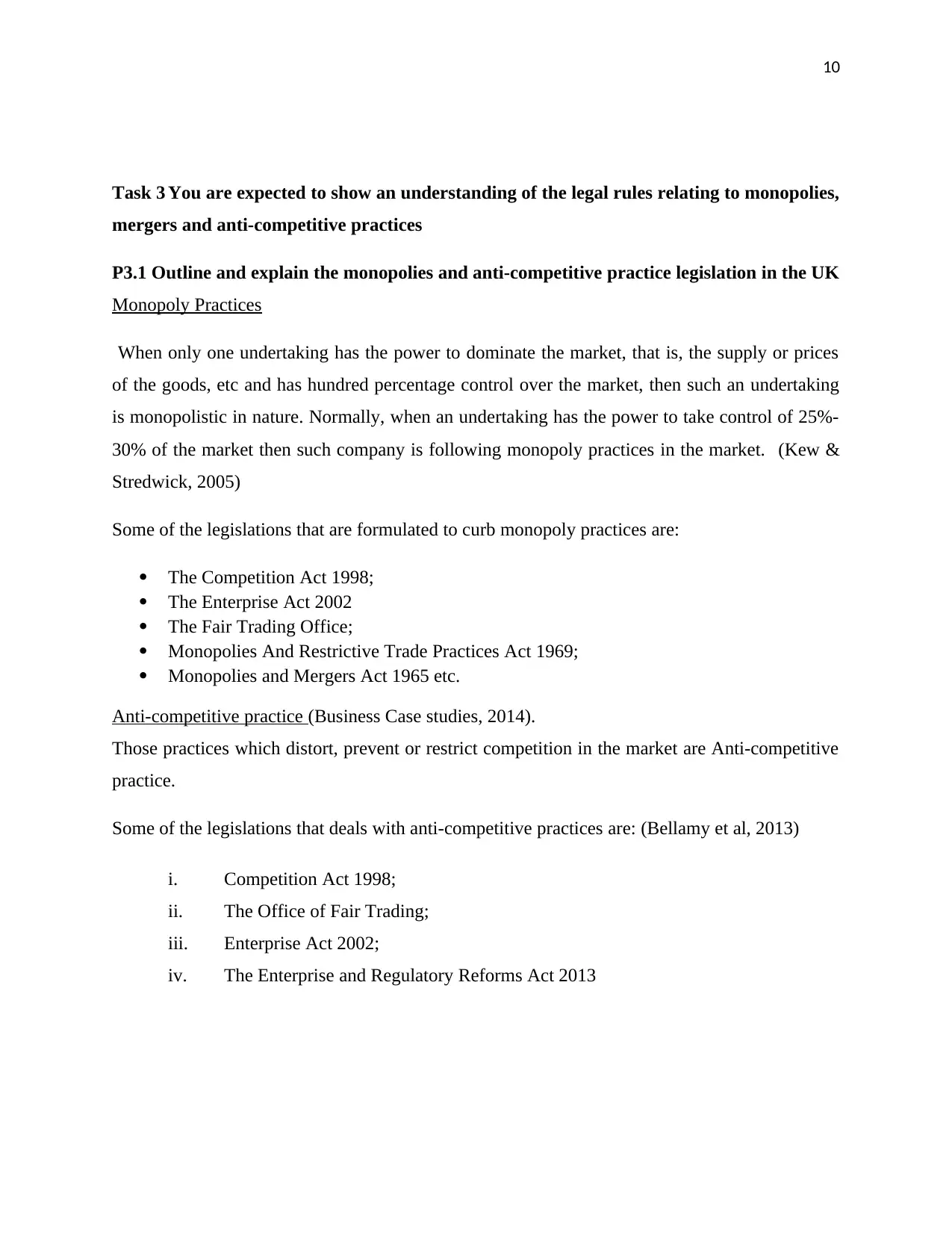
10
Task 3 You are expected to show an understanding of the legal rules relating to monopolies,
mergers and anti-competitive practices
P3.1 Outline and explain the monopolies and anti-competitive practice legislation in the UK
Monopoly Practices
When only one undertaking has the power to dominate the market, that is, the supply or prices
of the goods, etc and has hundred percentage control over the market, then such an undertaking
is monopolistic in nature. Normally, when an undertaking has the power to take control of 25%-
30% of the market then such company is following monopoly practices in the market. (Kew &
Stredwick, 2005)
Some of the legislations that are formulated to curb monopoly practices are:
The Competition Act 1998;
The Enterprise Act 2002
The Fair Trading Office;
Monopolies And Restrictive Trade Practices Act 1969;
Monopolies and Mergers Act 1965 etc.
Anti-competitive practice (Business Case studies, 2014).
Those practices which distort, prevent or restrict competition in the market are Anti-competitive
practice.
Some of the legislations that deals with anti-competitive practices are: (Bellamy et al, 2013)
i. Competition Act 1998;
ii. The Office of Fair Trading;
iii. Enterprise Act 2002;
iv. The Enterprise and Regulatory Reforms Act 2013
Task 3 You are expected to show an understanding of the legal rules relating to monopolies,
mergers and anti-competitive practices
P3.1 Outline and explain the monopolies and anti-competitive practice legislation in the UK
Monopoly Practices
When only one undertaking has the power to dominate the market, that is, the supply or prices
of the goods, etc and has hundred percentage control over the market, then such an undertaking
is monopolistic in nature. Normally, when an undertaking has the power to take control of 25%-
30% of the market then such company is following monopoly practices in the market. (Kew &
Stredwick, 2005)
Some of the legislations that are formulated to curb monopoly practices are:
The Competition Act 1998;
The Enterprise Act 2002
The Fair Trading Office;
Monopolies And Restrictive Trade Practices Act 1969;
Monopolies and Mergers Act 1965 etc.
Anti-competitive practice (Business Case studies, 2014).
Those practices which distort, prevent or restrict competition in the market are Anti-competitive
practice.
Some of the legislations that deals with anti-competitive practices are: (Bellamy et al, 2013)
i. Competition Act 1998;
ii. The Office of Fair Trading;
iii. Enterprise Act 2002;
iv. The Enterprise and Regulatory Reforms Act 2013
Paraphrase This Document
Need a fresh take? Get an instant paraphrase of this document with our AI Paraphraser
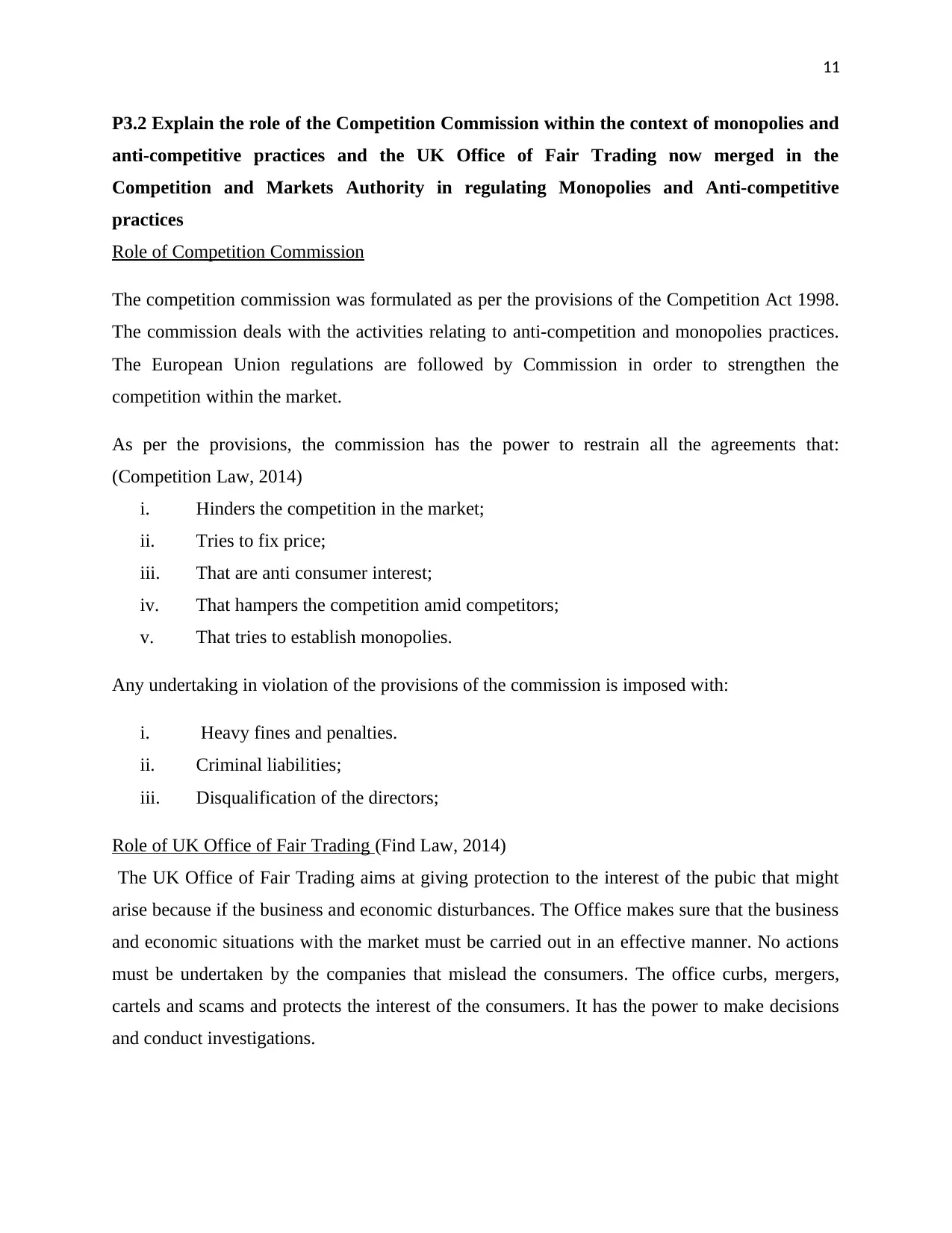
11
P3.2 Explain the role of the Competition Commission within the context of monopolies and
anti-competitive practices and the UK Office of Fair Trading now merged in the
Competition and Markets Authority in regulating Monopolies and Anti-competitive
practices
Role of Competition Commission
The competition commission was formulated as per the provisions of the Competition Act 1998.
The commission deals with the activities relating to anti-competition and monopolies practices.
The European Union regulations are followed by Commission in order to strengthen the
competition within the market.
As per the provisions, the commission has the power to restrain all the agreements that:
(Competition Law, 2014)
i. Hinders the competition in the market;
ii. Tries to fix price;
iii. That are anti consumer interest;
iv. That hampers the competition amid competitors;
v. That tries to establish monopolies.
Any undertaking in violation of the provisions of the commission is imposed with:
i. Heavy fines and penalties.
ii. Criminal liabilities;
iii. Disqualification of the directors;
Role of UK Office of Fair Trading (Find Law, 2014)
The UK Office of Fair Trading aims at giving protection to the interest of the pubic that might
arise because if the business and economic disturbances. The Office makes sure that the business
and economic situations with the market must be carried out in an effective manner. No actions
must be undertaken by the companies that mislead the consumers. The office curbs, mergers,
cartels and scams and protects the interest of the consumers. It has the power to make decisions
and conduct investigations.
P3.2 Explain the role of the Competition Commission within the context of monopolies and
anti-competitive practices and the UK Office of Fair Trading now merged in the
Competition and Markets Authority in regulating Monopolies and Anti-competitive
practices
Role of Competition Commission
The competition commission was formulated as per the provisions of the Competition Act 1998.
The commission deals with the activities relating to anti-competition and monopolies practices.
The European Union regulations are followed by Commission in order to strengthen the
competition within the market.
As per the provisions, the commission has the power to restrain all the agreements that:
(Competition Law, 2014)
i. Hinders the competition in the market;
ii. Tries to fix price;
iii. That are anti consumer interest;
iv. That hampers the competition amid competitors;
v. That tries to establish monopolies.
Any undertaking in violation of the provisions of the commission is imposed with:
i. Heavy fines and penalties.
ii. Criminal liabilities;
iii. Disqualification of the directors;
Role of UK Office of Fair Trading (Find Law, 2014)
The UK Office of Fair Trading aims at giving protection to the interest of the pubic that might
arise because if the business and economic disturbances. The Office makes sure that the business
and economic situations with the market must be carried out in an effective manner. No actions
must be undertaken by the companies that mislead the consumers. The office curbs, mergers,
cartels and scams and protects the interest of the consumers. It has the power to make decisions
and conduct investigations.
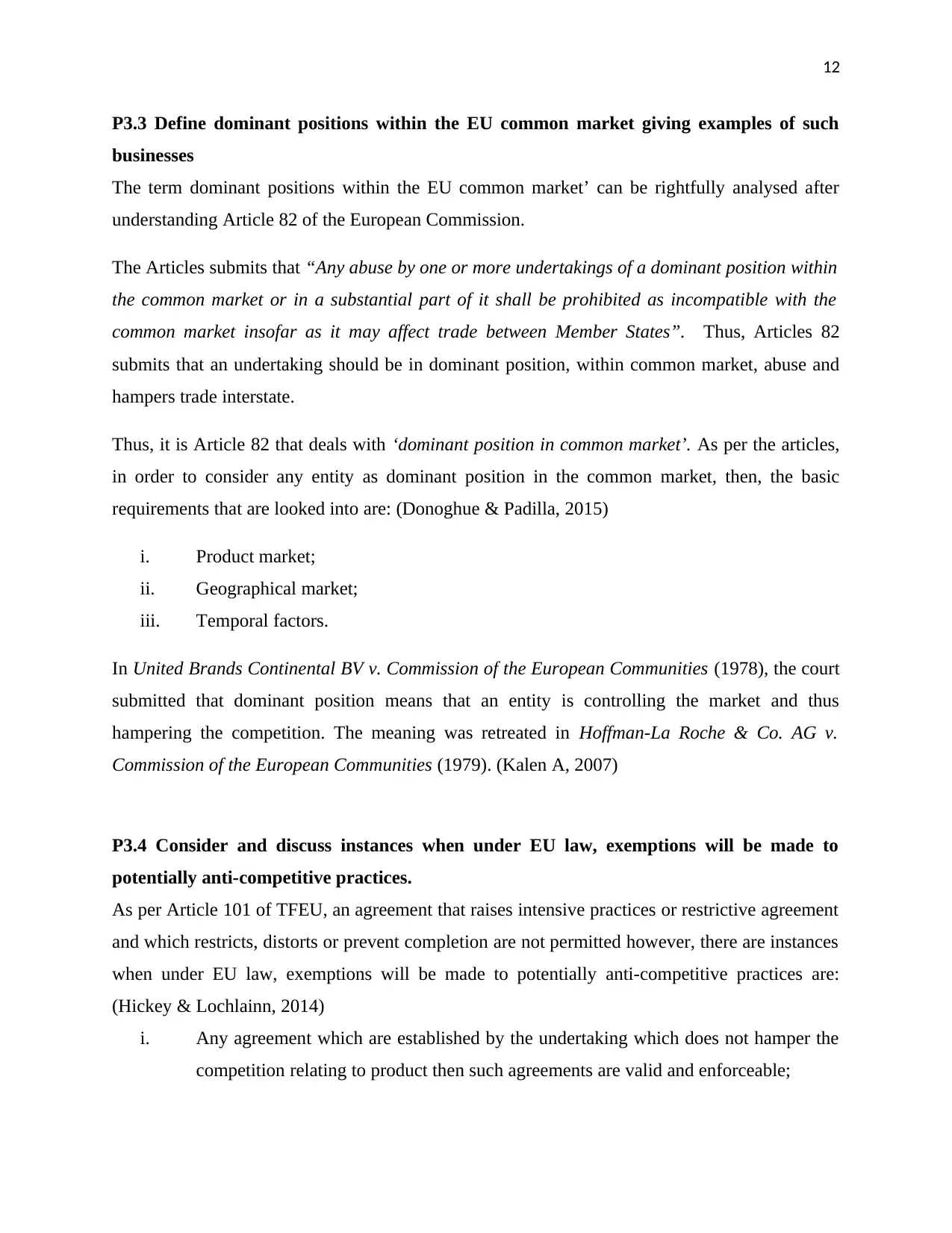
12
P3.3 Define dominant positions within the EU common market giving examples of such
businesses
The term dominant positions within the EU common market’ can be rightfully analysed after
understanding Article 82 of the European Commission.
The Articles submits that “Any abuse by one or more undertakings of a dominant position within
the common market or in a substantial part of it shall be prohibited as incompatible with the
common market insofar as it may affect trade between Member States”. Thus, Articles 82
submits that an undertaking should be in dominant position, within common market, abuse and
hampers trade interstate.
Thus, it is Article 82 that deals with ‘dominant position in common market’. As per the articles,
in order to consider any entity as dominant position in the common market, then, the basic
requirements that are looked into are: (Donoghue & Padilla, 2015)
i. Product market;
ii. Geographical market;
iii. Temporal factors.
In United Brands Continental BV v. Commission of the European Communities (1978), the court
submitted that dominant position means that an entity is controlling the market and thus
hampering the competition. The meaning was retreated in Hoffman-La Roche & Co. AG v.
Commission of the European Communities (1979). (Kalen A, 2007)
P3.4 Consider and discuss instances when under EU law, exemptions will be made to
potentially anti-competitive practices.
As per Article 101 of TFEU, an agreement that raises intensive practices or restrictive agreement
and which restricts, distorts or prevent completion are not permitted however, there are instances
when under EU law, exemptions will be made to potentially anti-competitive practices are:
(Hickey & Lochlainn, 2014)
i. Any agreement which are established by the undertaking which does not hamper the
competition relating to product then such agreements are valid and enforceable;
P3.3 Define dominant positions within the EU common market giving examples of such
businesses
The term dominant positions within the EU common market’ can be rightfully analysed after
understanding Article 82 of the European Commission.
The Articles submits that “Any abuse by one or more undertakings of a dominant position within
the common market or in a substantial part of it shall be prohibited as incompatible with the
common market insofar as it may affect trade between Member States”. Thus, Articles 82
submits that an undertaking should be in dominant position, within common market, abuse and
hampers trade interstate.
Thus, it is Article 82 that deals with ‘dominant position in common market’. As per the articles,
in order to consider any entity as dominant position in the common market, then, the basic
requirements that are looked into are: (Donoghue & Padilla, 2015)
i. Product market;
ii. Geographical market;
iii. Temporal factors.
In United Brands Continental BV v. Commission of the European Communities (1978), the court
submitted that dominant position means that an entity is controlling the market and thus
hampering the competition. The meaning was retreated in Hoffman-La Roche & Co. AG v.
Commission of the European Communities (1979). (Kalen A, 2007)
P3.4 Consider and discuss instances when under EU law, exemptions will be made to
potentially anti-competitive practices.
As per Article 101 of TFEU, an agreement that raises intensive practices or restrictive agreement
and which restricts, distorts or prevent completion are not permitted however, there are instances
when under EU law, exemptions will be made to potentially anti-competitive practices are:
(Hickey & Lochlainn, 2014)
i. Any agreement which are established by the undertaking which does not hamper the
competition relating to product then such agreements are valid and enforceable;
⊘ This is a preview!⊘
Do you want full access?
Subscribe today to unlock all pages.

Trusted by 1+ million students worldwide
1 out of 19
Related Documents
Your All-in-One AI-Powered Toolkit for Academic Success.
+13062052269
info@desklib.com
Available 24*7 on WhatsApp / Email
![[object Object]](/_next/static/media/star-bottom.7253800d.svg)
Unlock your academic potential
Copyright © 2020–2026 A2Z Services. All Rights Reserved. Developed and managed by ZUCOL.





